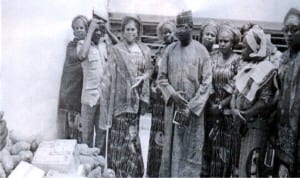Business
NDDC, Foundation To Partner On Youth Training

Sitting from left: Mr Habila Kaura; Chief of Ebba village, New Karu Nasarawa State, Chief Yakubu Maikabila; West African Regional Director, United States Latin American Chamber of Commerce (USLACC) Mrs Ifeoma Ejiogu and her husband, Mr Ejiogu, at the launch of Agriculture Youths Empowerment Programme at Ebba village in Nasarawa State last Monday.
The Niger Delta
Development Commission (NDDC) has said it would work closely with the Ford Foundation to train the youths in the region on business skills.
The acting Managing Director of the commission, Mrs Ibim Semenitari, disclosed this when she featured at a media forum in Abuja, recently.
Semenitari stated that the commission is focusing attention on human capital development in order to establish the platform for wealth creation amongst youths in the local communities of the region.
According to her, the idea is to create clusters of business people that will grow along the entire spectrum of micro to medium scale business.
“Already we are in conversation with Ford Foundation to say ‘work with us’ first because they’ve got the technical know-how, they’ve got the expertise, but they are also bringing some funds for NDDC.
“The story of NDDC ought to be partnership, partnership, partnership, and so we are bringing this back to the table.
“And that’s really my focus – to see as many partners as I can get to work with me.’’
Semenitari, who affirmed that it would be virtually impossible for NDDC to undertake sustainable development of the Niger Delta region by itself, however, promised that the commission would do its best possible to overcome the challenges in the region.
“Whenever we are able to talk to people, who are partners in development, it is always a great opportunity.
“We are shopping for partners who are willing to support us in the region to achieve our goals. Any kind of support is welcome.”
It would be recalled that NDDC recently entered into a partnership with the Presidential Amnesty Programme (PAP) with a view to reintegrating into the society 30,000 ex-agitators, who had been trained in various vocations.
Transport
Automated Points Concession : FAAN Workers Gave 72hrs To Revise Decisions In PH

Transport
FAAN Announces Pick-Up Points for Go-Cashless Cards

Business
Fidelity Bank To Empower Women With Sustainable Entrepreneurship Skills, HAP2.0
-
Politics2 days ago
2027: NIGERIANS FAULT INEC ON DIGITAL MEMBERSHIP REGISTER DIRECTIVE
-

 Environment3 days ago
Environment3 days agoLAWMA Director Says Sweeping Reforms Have Improved Waste Collection
-
Politics2 days ago
LP Crisis: Ex-NWC Member Dumps Dumps Abure Faction
-

 Politics2 days ago
Politics2 days agoUmahi Dismisses Allegations On Social Media, Insists On Projects Delivery
-

 Sports2 days ago
Sports2 days agoAbia Not Sure To Secure continental Ticket
-
Sports2 days ago
La Liga: Yamal Records First Career Hat-trick
-
Politics2 days ago
NATASHA ELECTRIC VEHICLES INITIATIVE IN KOGI CENTRAL
-
Politics2 days ago
IT’S A LIE, G-5 GOVS DIDN’T WIN ELECTION FOR TINUBU – SOWUNMI

